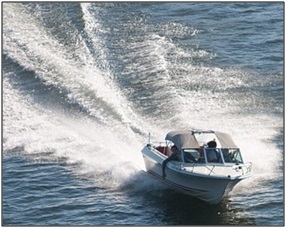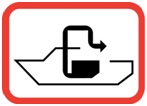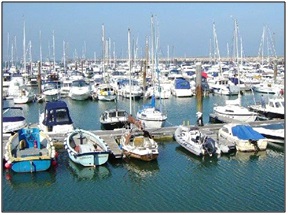Boating and Marinas

Boating, Marinas and NPS Pollution
Nonpoint source pollution from boating and marina activities can have significant adverse impacts on the coastal environment. These impacts primarily result from activities involving waste and contaminants occurring directly in or adjacent to the water.
As described below, there are a number of activities related to boating and marinas that must be properly managed in order to maintaining good water quality and a healthy aquatic environment, including:
- Hull Maintenance
- Boat Cleaning
- Boat Sewage
- Gas and Oil from Engine Maintenance
- Bilge Water and Fueling
- Fish Waste
- Invasive Species
- Boat Operation
Hull Maintenance: Hull scraping, pressure washing, sanding and painting generate paint chips that can be washed into the water when it rains. Painting can also expose fresh paint to marine organisms. Hull paints can contain metals such as tin and copper, pesticides, and toxic substances known as volatile organic compounds (VOCs). Shellfish are particularly vulnerable to these pollutants because paint chips sink through the water and settle in the sediments where clams, oysters, and mussels live and feed. Humans and other animals are exposed to these contaminants when they consume shellfish (CZM 2001).
Boat Cleaning: Soaps used for boat cleaning can contain chlorine and nutrients such as ammonia and phosphates that can be harmful to marine life. These chemicals can disrupt the food chain as well as cause excessive plant and algae growth that can decrease the amount of oxygen available to other organisms. Excess use of soaps and solvents can harm marine life. The greatest impact occurs in surface waters, where soaps are most concentrated and where plankton – tiny creatures at the bottom of the food chain – is most abundant. Soaps can also break down oil products floating on the water surface and become exposed to marine life that inhabits the water column (CZM 2001).
 Boat Sewage:
Boat Sewage: Raw sewage contains water-borne disease and pathogens which can cause diseases and illnesses. Holding tanks on boats and rest rooms in marinas are potential sources of raw sewage. While some toilets on boats treat waste before discharging it into the ocean, this does not completely remove nutrients, bacteria, and chemical additives. Bacteria from this sewage can collect in shellfish and may be consumed by humans. Nutrients from sewage can also lead to reduced oxygen levels and cause excessive growth of marine plants/algae and the death of marine animals. Increased nutrients can trigger a chain reaction that starts with the excessive growth of marine plants and algae, and can lead to an overabundance of bacteria that breakdown dying plants and at the same time further deplete dissolved oxygen in bottom waters. When oxygen is depleted by the bacteria in bottom waters, a dead zone develops. This problem is exacerbated in protected coves and shallow waters, particularly during the very hot days of summer often after heavy rains that add massive amounts of runoff from all sources. Increased water temperature accelerates bacteria metabolism, activity, and growth (CZM 2001).
 Gas and Oil from Engine Maintenance, Fueling, and Deck/Bilge Water:
Gas and Oil from Engine Maintenance, Fueling, and Deck/Bilge Water: Oil and anti-freeze are polycyclic aromatic hydrocarbons, a family of chemicals that can cause abnormal cell development and cancer. Oil also contains other chemicals components, such as zinc and sulfur, at toxic levels. Solvents are comprised of carbon compounds that are also toxic. Spills of gasoline and oil during boat fueling are common. In addition, oil, grease and other pollutants from engines, leaky fuel lines and boat deck washing can are often deposited directly into the water. While large spills are uncommon, small spills occur regularly, and this can be enough to cause impacts to the local marine environment. Most petroleum products, particularly fuel and oil, will float if spilled on water. Bilge water collects oil, grease, and other pollutants from the engine, leaky fuel lines, and the washing down of the boat deck. When gasoline gets into the bilge, a hazardous condition can develop that can lead to gas combustion and an explosion. Because bilge water is always being collected, it and the pollutants it contains, are regularly discharged to coastal waters where the fuel or oil component can harm birds and small animals, which also float or dive into the water (CZM 2001).
Fish Waste: Bait, fish and other waste from fishing activities are often dumped overboard at marinas in large quantities. Dead fish and fish parts are colonized by bacteria leading to low oxygen zones in the water creating both life threatening conditions for wildlife and unpleasant conditions in the marina. This problem is exacerbated by hot summer days when conditions for bacteria growth are most favorable (CZM 2001).
Invasive Species: Invasive species are non-native organisms that can be extremely harmful to an ecosystem and boating is one of the primary ways these species are transferred between water bodies. Proper boat washing and inspection are crucial in order to prevent these transfers. When boats and trailers are transported between lakes, ponds or coastal waters, there is a risk of introducing invasive species through hull fouling, entanglement, and water discharge from bilge pumps and bait buckets (CZM 2001).
Boat Operation: Improper boat operation can destroy wildlife habitat by scouring bottom sediments, increase turbidity (cloudiness), and damaging sensitive plant beds. Particularly in shallow waterways, propellers can hit the bottom and uproot submerged vegetation and large boat wakes can cause increased shoreline erosion (USEPA 1993, CZM 2001).
Boating and Marina Resources
Massachusetts Clean Marina Guide: This guide, produced by the Massachusetts Office of Coastal Zone Management (CZM), provides a comprehensive reference for owners and operators of marinas on strategies to reduce marina and boating impacts on the coastal environment.
Massachusetts Clean Marina Guide
Sewage Pumpout Facilities: Boat pumpout facilities provide a convenient way to properly dispose of boat sewage. Many of the more than 100 pumpouts in Massachusetts are pumpout boats. These vessels have the capacity to bring the pumpout to the boater, providing added convenience. A complete list of vessel pumpout facilities in Massachusetts can be found at:
Boat Pumpout Facilities in Coastal Massachusetts
Boaters Pocket Guide to Pumpout Facilities and Tides: The Massachusetts Clean Vessel Act Program produces this wallet-sized guide, which is printed on water-proof paper and contains pumpout information and a tide chart for Massachusetts. To get a copy, email your request and mailing address to:
marine.fish@state.ma.us.
National Management Measures to Control Nonpoint Source Pollution from Marinas and Recreational Boating: This USEPA publication provides technical guidance for use by State, local, and tribal managers in the implementation of nonpoint source pollution management programs. It contains information on the best available, economically achievable means of reducing pollution of surface water runoff from marinas and recreational boating.
http://water.epa.gov/polwaste/nps/marinas/mmsp_index.cfm
CZM’s
Coastal Pollutant Remediation Grant Program provides grants to
coastal communities to assess and treat stormwater pollution from paved surfaces and to design and construct commercial boat waste pumpout facilities.
Best Management Practices for Boating and Marinas
A summary of Best Management Practices (BMPs) commonly used to reduce nonpoint source pollution from marina and boating activities are provided via the fact sheet links below. These fact sheets are excerpted from the
Massachusetts Clean Marina Guide.
Fact Sheet Links
Click the links below for information on BMPs related to boating and marina operations.